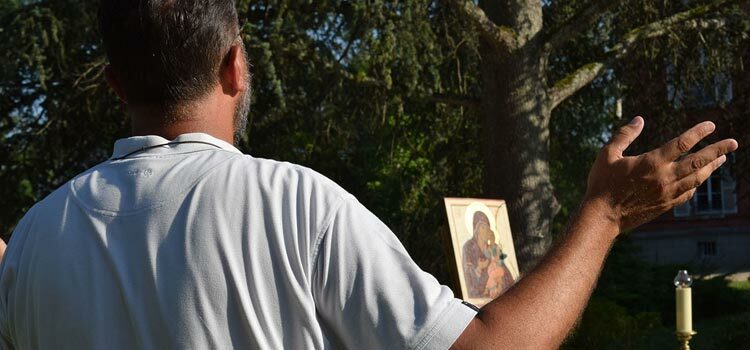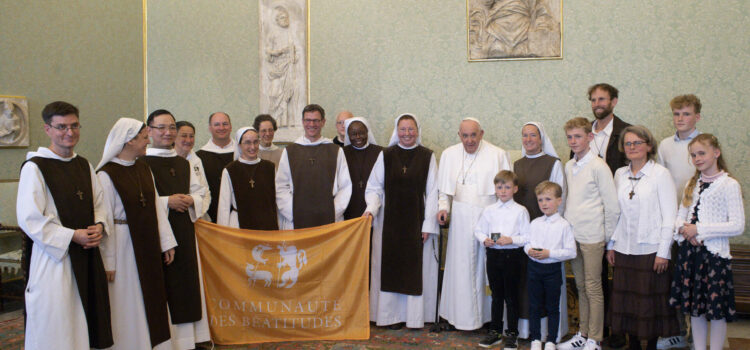Have you ever heard that, in orison, the main thing is to be receptive, to put aside our frenzied daily activity in order to receive ? And have you ever felt a vague frustration like : easy to say but how to go about it ? What do we mean by an attitude of receptivity in orison ? Why is it so important ? How can we grow in this attitude ? This is what we shall look into.
Some anthropological aspects
At the time of creation, « God formed man of the dust of the ground, and breathed into his nostrils the breath of life and man became a living being » (Gen.2,7). Since then, breathing is the sure sign of life. I breathe without having to think about it, in a rhythm of my own that inhabits me and « works » on its own. At the same time our life itself is a gift and if God stopped giving us the breath of life we would instantly cease to exist. I am a creature that receives itself at every moment, from the loving will of its Creator.
Let’s take a second fundamental aspect of our created being : « The Lord God said : It is not good that the man should be alone » (Gen.2,18). He gave him a helper, a companion like himself. We are created as beings of relationship, radically dependent on others. We are all born of others and we become adults through the gift of others. An adult man becomes autonomous and capable of giving life in his turn – which again presupposes that he lives in relationship. Nobody can live in a selfsufficient manner and the capacity of autonomy can become a trap. We are free to cut ourselves off from others, to be self-sufficient, to be addicted to activism, self-control and misunderstood responsability. It may then be necessary to relearn an attitude of receptivity. How often are we blocked or dissatisfied with the quality of our human relationships, simply because we believe we know everything about the other person and are not willing to accept that person as a gift constantly renewed ?
What applies to my relationship with my neighbor applies equally to my relationship with God, especially since in our relationship with God we depend in a more obvious way on His initiative. If He did not reveal Himself, if he did not give Himself, we would have no possibility of knowing Him or entering into a relationship with Him. He is the one who loves us first !
Receptivity in orison
We must take care not to misunderstand the passive aspect of this attitude. There are different stages and periods in a life of prayer. The deepening of one’s prayer life is usually accompanied by a simplification of methods and a more passive presence of the praying person. But no matter where we are in our journey, receptivity is crucial. To truly enter into this « friendly intercourse » with God, as Teresa of Avila calls it, my whole being must reach out to the One who loves me. This is true for those who practice vocal or mental prayer as well as for those who pray in the silence of a simple loving presence. It is the Spirit who leads me in my prayer life. For my part, I can surrender and make myself available to his actions by improving my receptivity, an attitude of empty hands and spiritual childhood. It is not so simple for beings so used to seeking independence, power and possession. To allow the other to surprise us but also to approach him without preconceived ideas, without knowing everything, without goals or plans. Let’s admit that it costs us. It is a path of letting go : surrendering, ceasing to want to control everything, opening ourselves to the unknown. Jesus warned us : “Apart from me you can do nothing” (Jn 15 : 5). He does not say this to show us our helplessness but to call us to Him, so that we allow Him to give us everything we need.
How can I progress ?
Receptivity is inscribed very deeply in us. We have only to reach back to what we have left behind.
Our body offers us some precious aids for this. I can start by paying attention to my breathing or the beating of my heart, perceiving what is inside me, what is offered to me and which gives me life. Many meditation techniques recommend this simple attention to the rhythm of our breath. In fact, it is an anchor to establish myself in my state as a creature that receives itself from its Creator at every moment.
Certain gestures when praying can also help : opening my hands to express that I am not holding anything back, that I am reaching out to the other person making myself available to him, listening and welcoming him. The attitude of my body can also help : the way I sit or kneel can express openness, interest, respect, attention and the desire to receive.
Then, whatever my way of praying at any given moment : what do I focus on ? Am I focused primarily on myself, my problems and joys, my plans and desires ? The thing with God is that He is very polite and tactful. Where my neighbor would have interrupted me long ago in my endless talk about myself, the Lord will listen to me with unflappable patience. He is an expert in receptivity. What if I stopped ? If I dared to trust this God who knows me better than myself and who hardly needs long explanations to understand what is in my heart ? What if I concerned myself with what is in His Heart ?
What happens then ?
Most of the time, nothing much, or better said, great things in an unnoticed way. I set myself in the presence of God, offering Him time and space within and letting Him act as He wishes ! Let Him continue his work as Creator and Redeemer in me. I may taste somehing of His action, often I do not. However, He acts on my psyche and my will, on my intelligence and my senses, in short, on my whole being to transform it little by little and make it each time more alive and like Himself.
Receptivity opens me to what God alone can do in me and for me. I shall perceive the fruits of this in my daily life when I become capable of receiving with gratitude and respect the reality such as it will give itself to me
Quote
« The path to holiness does not involve a dramatic renonciation (…) it can only be given and all that is needed is to ask for it. As soon as we stop focusing unnecessarily on ourselves and acknowledge our weakness, our need, the way is open to encountering God and the holiness of Jesus which is a gift. »
Sr Ruth Burrows
Cardinal Joseph Ratzinger
« From the point of view of the Christian faith, man comes to himself, in the deepest sense, not by what he does but by what he receives. He must wait for the gift of love, and love can only be received as a gift. Love cannnot be « made » by ourselves, without someone else. We have to wait for it, let it be given to us. We cannot become fully human except by being loved and accepting to be loved (…) The primacy of ‘receiving’, does not comdemn man to passivity ; it does not mean that man can now remain with his arms folded (…) On the contrary, it alone makes it possible to do the things of this world in a spirit of responsibility, albeit in a detached, joyful and free manner and to place them at the service of redemptive love. ».
To go further…Just for today
Readings
Vidéo :
|
Find the previous articles in our “Life of prayer” series.
(publication edited by brothers and sisters of the Community of the Beatitudes – © rights reserved).






